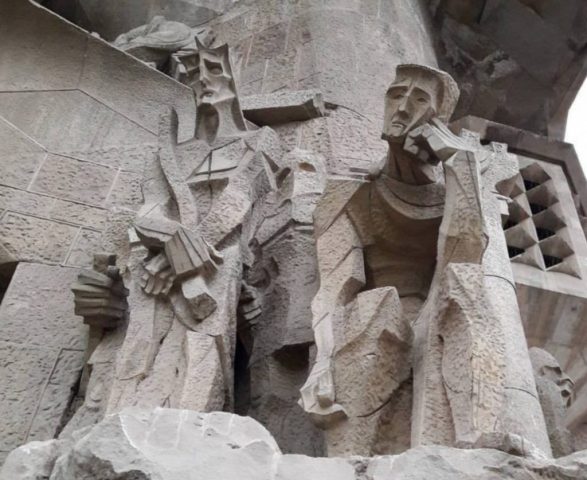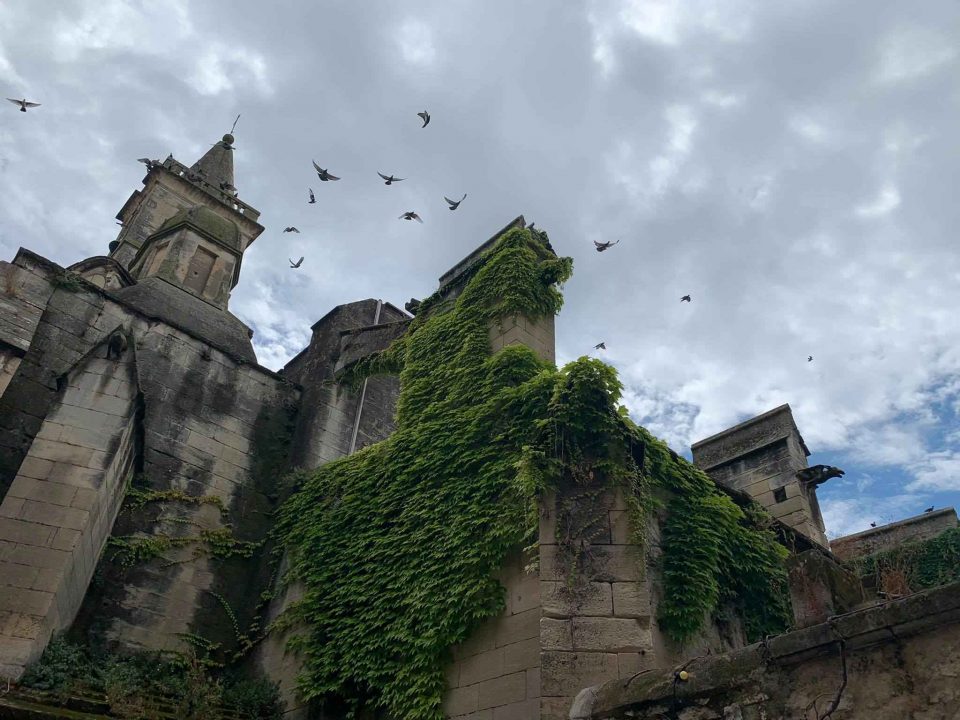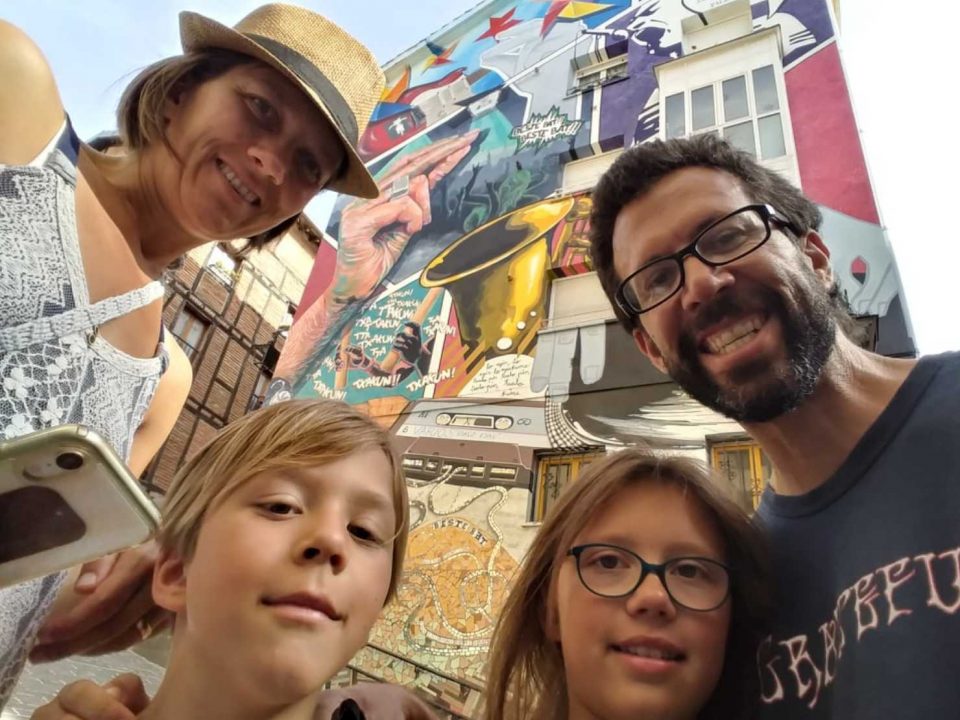
Greater Catalonia: 6 Definitive Day Trips from Barcelona
November 30, 2016
Spanish Immersion: Mi Queso es Su Queso, and other cultural conundrums
December 4, 2016Most visitors will be content to gaze agog with jaw wide open at La Sagrada Familia, an architectural feat of unmatched ambition. But if you’re like me—and I’m sure you are—you will be forced to devote an inordinate amount of time reflecting on the theological implications of a church construction project that will quite possibly drag out for all of eternity. So that’s what I did, and I soon realized that Gaudi’s magnum opus was just swimming in religious undercurrents.
If at any point on your visit to this gargantuan House of God, you should happen to give any thought to the Old Testament, it would be hard to overlook the kinship between the 172.5-meter-high Sagrada Familia and the fabled Tower of Babel. The visionary architect Antonio Gaudi began designing the mammoth cathedral in 1872 and commenced construction in Barcelona a decade later.
In 1926, with the project approximately 15 percent finished, Gaudi was killed, as if by an act of God, when he was struck by a car on his way to church. This of course was not enough to stymie the project, but for the last 90 years, construction workers and vehicles have continued to scurry about the premises like so many frantic Babylonian builders.
When King Nimrod, in the Book of Genesis, schemed to build a tower that would reach past the sky and into the heavens, God saw fit to punish the king for having too much pride. He made sure that the Tower of Babel would never be completed, that heaven would not be touched. As with the quest for holy perfection, the devotee may work forever toward spiritual growth, always improving, but never reaching the finish line. The journey, as the Taoists say, is the reward.
The Greeks have their own story to illustrate such a never-ending task. Of course, I’m referring to the Myth of Sisyphus, in which Zeus punishes another conniving king, sentencing him to spend his eternal afterlife trying to roll a rock to the top of an insurmountable hill. Granted, construction of the actual cathedral might not truly last an eternity, but even if it is finished on schedule—how very unlikely—the project’s timetable will still rival those of the Great Wall of China and the Pyramid at Giza.
King Sisyphus is given a hellacious task, but like any epic undertaking, there is something noble about his efforts. He demonstrates for us the value of committing oneself to a project of immense scope. Like Gaudi and Nimrod, Sisyphus aims for immeasurable heights, strives to reach the unreachable. As a myth involving gods and the underworld, we have to recognize the divine nature of Sisyphus’s chore. He too is reaching for the realm of the heavens, striving for contact with the infinite being, the universal source, the ultimate connection with one and all.
The Old Testament offers one more, less familiar story, to convey the same message in still another way. The episode involves the transportation of the Ark of the Covenant. When an ox, pulling the ark of God, stumbles, Uzzah reaches out with one hand to steady the ark. In His anger, the Lord strikes Uzzah dead on the spot for this irreverent act. (The scene, however brief, appears twice: 2 Samuel 6:1-7 and 1 Chronicles 13:9-12.)
The Jahweh of the Old Testament is truly ruthless and merciless (not much worse than the car that struck Gaudi dead in the street) but the passage ought to be read figuratively. In reaching out to touch the ark, Uzzah was violating a strict edict, the same law encountered by Nimrod, Sisyphus and Gaudi. The Word of God, contained in the ark, cannot be touched, not directly.
Through myths and stories, we can speak indirectly about the higher realms. But if we reach out to touch them, our efforts will only be in vein. Such things are ethereal, not of this earth. We can long for direct, divine experience—and we should—but we can never hold it in the palms of our hands. it. There is no tangible contact with the absolute, no direct knowledge of God. We can only approach it asymptotically.
Nineteenth century philosopher and theologian Soren Kierkegaard emphasized this same principle in one his more interesting and provocative essays. Advocating for what he called a Leap of Faith, Kierkegaard explained that if God wanted us to have proof of His existence, he surely would have provided it. But instead the spiritual life is grounded not on proof, but on belief. It is a personal, spiritual process, not an absolute and objective terminus.
Now maybe you don’t buy into all this metaphysical mumbo jumbo. That’s fine. Who could blame you? But even even your mundane daily duties, you must have noticed that the satisfaction you get from completing a project of any magnitude—a little endorphin rush that last a few minutes, or maybe a whole day in the most extreme cases—still pales in comparison to the ongoing satisfaction you get from being involved in a project you find meaningful and worthwhile. The journey, once again, outshines the destination.
In the end, I seem to have gotten more than I bargained for from my 18 euro admission into La Sagrada Famila. It gave me a lot to think about, though it brought me no closer to my destination. So in the meantime, I hope that all your tasks and toils may be deep and meaningful, bringing you ever nearer to that place of universal connectivity. Never stop reaching for the stars, but don’t be too disappointed if you fall short. And finally, be mindful of Gaudi’s response to his engineers when they told him that his grandiose idea would take centuries to complete. “No problem,” he said, “my client is not in a hurry.”
For more entertaining stories and suggestions from the esoteric tourist, check out the following articles.





